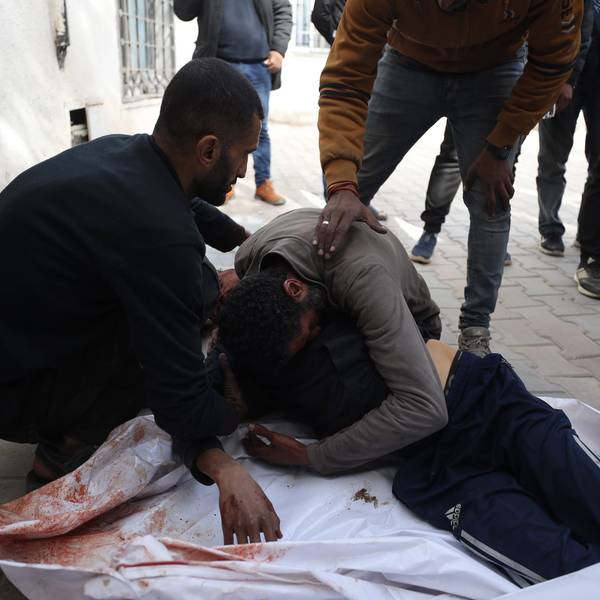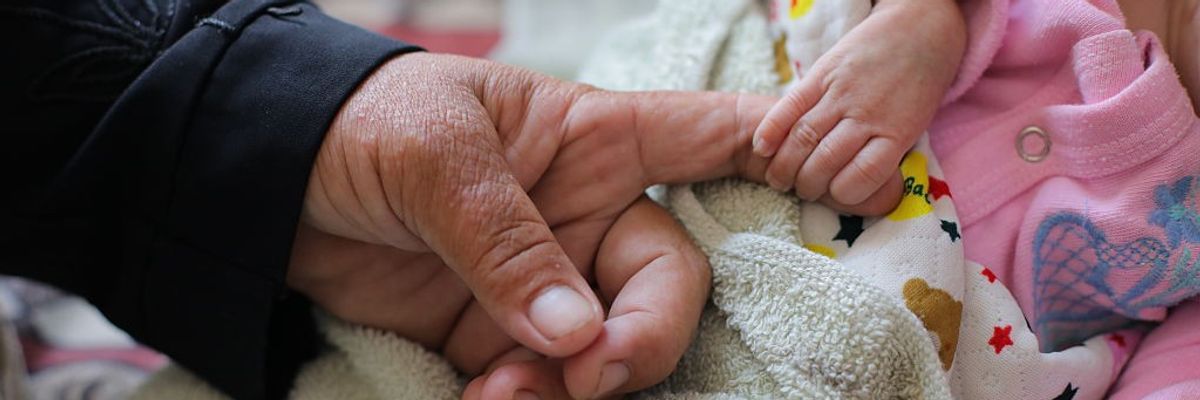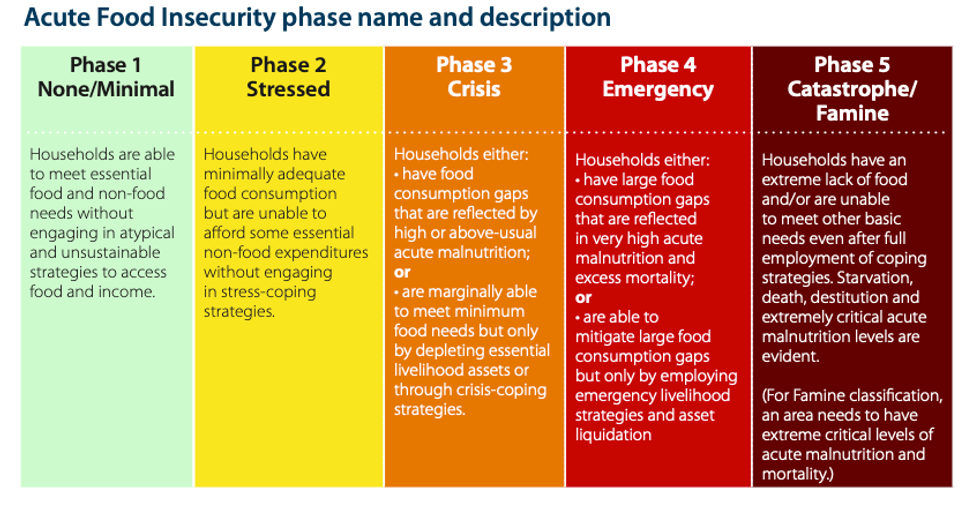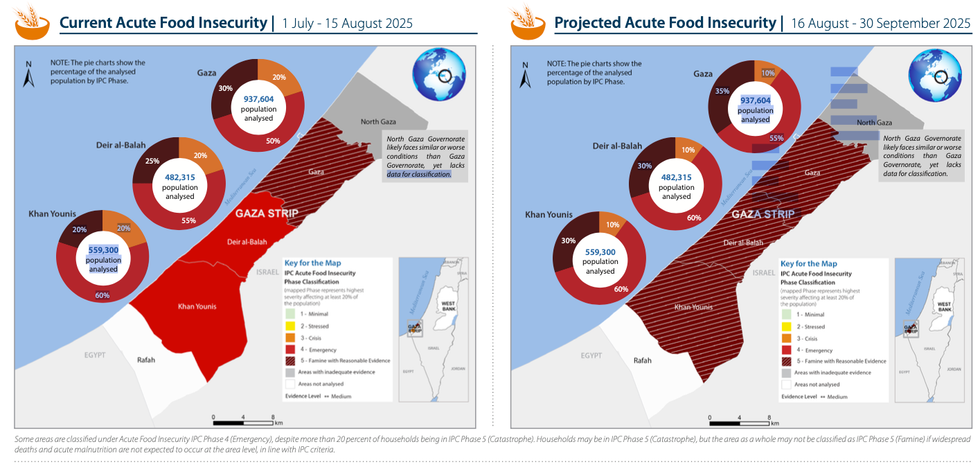The world's top authority on hunger crises officially declared Friday that a famine of the most severe kind is the reality in Gaza—a humanitarian disaster engineered by Israel's relentless blockade of food aid and other life-saving supplies amid a military campaign that makes little to no distinction between civilians and possible Palestinian fighters living in the occupied enclave.
The Integrated Food Security Phase Classification (IPC)—the multi-stakeholder global initiative which integrates international, regional, and national governments and agencies to monitor and respond to food-related emergencies—issued a "special snapshot" on the situation in Gaza and determined that "Famine (IPC Phase 5)—with reasonable evidence—is confirmed in Gaza Governorate."
Phase 5 is the highest level of its famine emergency categories, which, according to the IPC, which means the situation is beyond Category 4 ("Emergency") and now represents a "Catastrophe."
 (Image: The Integrated Food Security Phase Classification)
(Image: The Integrated Food Security Phase Classification)
According to the IPC's snapshot assessment:
After 22 months of relentless conflict, over half a million people in the Gaza Strip are facing catastrophic conditions characterised by starvation, destitution and death. Another 1.07 million people (54 percent) are in Emergency (IPC Phase 4), and 396,000 people (20 percent) are in Crisis (IPC Phase 3).
Between mid-August and the end of September 2025, conditions are expected to further worsen with Famine projected to expand to Deir al-Balah and Khan Younis. Nearly a third of the population (641,000 people) are expected to face catastrophic conditions (IPC Phase 5), while those in Emergency (IPC Phase 4) will likely rise to 1.14 million (58 percent). Acute malnutrition is projected to continue worsening rapidly.
Through June 2026, at least 132,000 children under five are expected to suffer from acute malnutrition—double the IPC estimates from May 2025. This includes over 41,000 severe cases of children at heightened risk of death. Nearly 55,500 malnourished pregnant and breastfeeding women will also require urgent nutrition response.
Despite limited data, conditions in North Gaza Governorate are estimated to be as severe—or worse—than in Gaza Governorate.
Download the complete four-page assessment released Friday. The agency said a more complete assessment of its findings will be put out in the coming weeks.
Humanitarians, human rights groups, and relief organizations, which for months have desperately warned world leaders that starvation and malnutrition were rapidly spreading, reacted to the IPC designation—given the global community's failure to force Israel into compliance with international law—with a mix of fury and frustration.
"Despite warnings in July that famine was imminent, Israel has continued to deprive Palestinians of food, denying almost every request from long-established humanitarian agencies, preventing them from delivering vital food and aid that could have stemmed hunger, malnutrition, and disease," said Helen Stawski, the policy lead for Oxfam International.
 (Image: IPC assessment)
(Image: IPC assessment)
Stawski placed the blame squarely on Israel's government for blocking food and other supplies that could otherwise be saving lives.
"Oxfam alone has more than $2.5 million worth of life-saving aid, including high-calorie food packages—now sitting in warehouses outside Gaza," she said. "Israeli authorities have rejected it all, at a time when it is needed more than ever."
Inger Ashing, CEO of Save the Children International, rebuked the inaction of global actors who stood by while Israel and its allies allowed to the famine to take hold.
"The world has been watching as children have suffered the unthinkable for nearly two years in Gaza, and now, we have confirmation that hundreds of thousands are being slowly starved to death. None of us should accept this," said Ashing.
"All of Gaza is being systematically starved by design, and children are paying the highest price. The world has failed to act as their tiny, emaciated bodies have been overcome by hunger and disease and shut down," she added. "This engineered famine is the ultimate and inevitable result of the Government of Israel's use of starvation as a weapon of war. The sustained siege on food, medicine, and fuel was bound to lead to this preventable catastrophe. There is no world leader who did not know this was coming, who hasn't been warned again and again."
What's urgently needed now, say experts, is an immediate ceasefire and a return to the UN-backed humanitarian aid distribution system that was sidelined by the Israeli and US governments that put the ill-conceived and euphemistically named Gaza Humanitarian Foundation, stocked with private contractors and protected by IDF forces and mercenaries, in charge of food operations that have led to chaos and hundreds of killings around its distribution sites.
The IPC assessment called for the following actions in order to end the famine:
- Immediate and sustained cessation of hostilities
To prevent further loss of life and famine from spreading further, an immediate ceasefire and putting an end to the conflict is critical. - Guarantee unconditional and safe humanitarian access
Safe, stable, and unhindered access must be guaranteed through all entry points, in full respect of international humanitarian law, allowing for lifesaving assistance and essential services to reach all people in need across the Gaza Strip. Access must also be granted urgently to allow for a comprehensive humanitarian assessment, in particular in North Gaza Governorate. - Immediate, large-scale, unobstructed multi-sector humanitarian assistance is needed to avert further destitution, starvation and death. This includes the provision of food, nutrition, health, WASH, shelter, fuel, cooking gas and food production inputs, while safeguarding humanitarian principles. This is also the only way to stop the interception of aid trucks by desperate populations.
- Protect civilians and critical infrastructure
Ensure the safety of civilians and humanitarian personnel across the Gaza Strip. Protect and restore critical infrastructure essential for survival and for the functioning of food, health and WASH systems. - Restore commercial flows at scale, market systems, essential services, and local food production.
"Famine means there are no more breaking points and no more alarm bells," said Ashing. "The Government of Israel must immediately end the use of starvation as a weapon of war and lift the siege of the Gaza Strip, allowing aid, including food and nutrition supplies, into Gaza at the scale required, and restore electricity, fuel, and water."
The international community, she concluded, "must finally take every possible step to stop the Government of Israel from intentionally starving children and families in Gaza."





 (Image: The Integrated Food Security Phase Classification)
(Image: The Integrated Food Security Phase Classification) (Image: IPC assessment)
(Image: IPC assessment)